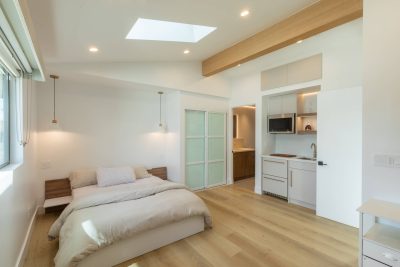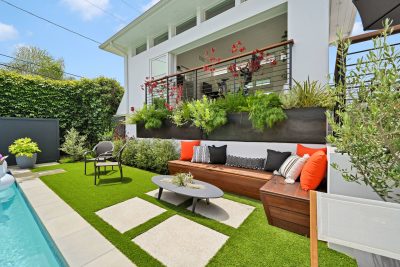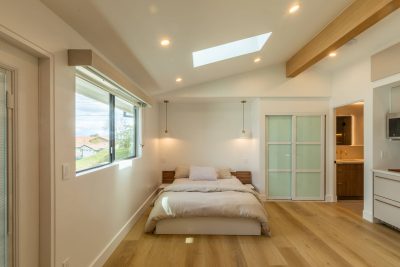
ADU Design & Build in Woodland Hills: Transform Your Home
November 3, 2024
Introduction
ADU Design & Build in Woodland Hills: Are you considering enhancing your property with an ADU design & build in Woodland Hills? If so, you’re tapping into a transformative trend that’s reshaping the way homeowners utilize their spaces. Accessory Dwelling Units (ADUs) have become a popular solution for those looking to maximize their property’s potential, increase its value, and provide versatile housing options in an ever-evolving real estate market.
These secondary units offer a unique blend of functionality and convenience, catering to a variety of needs—from accommodating extended family to generating additional income through rentals. In Woodland Hills, the surge in ADU construction is more than a trend; it’s a reflection of a community embracing innovative living solutions. By adding an ADU, you’re not just expanding your living space; you’re investing in a future-proof asset that adapts to your lifestyle while contributing positively to the local housing landscape.
The Growing Popularity of ADUs in Woodland Hills
Understanding the ADU Boom
In recent years, ADU design & build in Woodland Hills has gained significant traction among homeowners and real estate developers alike. This surge is largely attributed to progressive changes in legislation that have streamlined the approval process, making it more accessible and affordable to add these units to existing properties. The state and local governments recognize the potential of ADUs to address housing shortages and promote sustainable urban growth. ADUs offer unparalleled flexibility, whether you’re looking to house extended family members, provide a comfortable space for aging parents, or capitalize on rental income opportunities in a high-demand area. They effectively transform underutilized spaces into functional living areas, aligning with modern needs for efficiency and adaptability. This boom reflects a broader shift towards smart, sustainable living solutions that benefit both homeowners and the community at large.
Benefits of Building an ADU
Building an ADU comes with a multitude of advantages that extend beyond mere space expansion. Firstly, it can significantly increase your property’s market value by adding a fully equipped, independent living unit to your asset portfolio. This enhancement not only makes your property more attractive to potential buyers but also positions it competitively in a robust real estate market. Secondly, an ADU provides an excellent opportunity for passive income if you choose to rent it out. With the high demand for housing in Woodland Hills, renting out your ADU can yield substantial financial returns, helping to offset mortgage payments or fund other investments. Lastly, an ADU serves as a practical solution for multigenerational living, enabling you to keep family members close while maintaining personal privacy and independence. This arrangement fosters stronger family bonds and provides a supportive environment without the constraints of shared living spaces.
Designing Your ADU: Key Considerations
Assessing Your Space and Needs
Before embarking on the ADU design & build in Woodland Hills, it’s crucial to conduct a thorough assessment of your property’s capabilities and your specific objectives. Evaluate the size and layout of your lot to determine the best placement for the ADU, ensuring it complements the existing structures and landscaping. Familiarize yourself with zoning regulations, building codes, and any homeowners association guidelines that may influence your project. Understanding these parameters will help you design an ADU that is compliant and optimized for your property’s unique characteristics. Consider the primary purpose of your ADU: Will it function as a rental unit to generate income, a comfortable guest house for visitors, or a dedicated space for a home office or studio? Clarifying your needs will guide crucial design decisions, from the floor plan and amenities to accessibility features and technological integrations.
Architectural Style and Aesthetics
The architectural design of your ADU should harmoniously blend with the existing style of your home and the surrounding neighborhood. Woodland Hills is known for its diverse architectural landscapes, ranging from mid-century modern homes to traditional craftsman styles. By aligning your ADU’s aesthetics with these prevalent themes, you enhance not only your property’s visual appeal but also its value. Consider elements such as rooflines, exterior finishes, window styles, and color palettes that mirror or complement your main residence. This cohesive approach creates a seamless integration, making the ADU feel like a natural extension of your home rather than an afterthought. Thoughtful landscaping around the ADU can further enhance its appearance, providing privacy and adding to the overall ambiance of your property.
Navigating Zoning and Permits in Woodland Hills
Understanding Local Regulations
Embarking on an ADU design & build in Woodland Hills necessitates a comprehensive understanding of local zoning laws and building codes. These regulations dictate critical aspects of your project, including allowable sizes, height restrictions, setback requirements, and occupancy limits. For instance, there may be specific guidelines on the maximum square footage relative to your lot size or stipulations on parking provisions for the new unit. Ignorance of these regulations can lead to costly delays, fines, or the need for significant redesigns. Therefore, it’s advisable to consult with city planning officials or a knowledgeable contractor early in the process to ensure your plans align with all legal requirements. Staying informed not only streamlines the approval process but also helps you make informed decisions that optimize the functionality and legality of your ADU.
Securing the Necessary Permits
Obtaining the right permits is a critical step in the ADU construction process and cannot be overlooked. This involves submitting detailed plans and documentation to local authorities for approval, a process that ensures your project adheres to all safety and building standards. The permit process may require architectural drawings, structural calculations, and energy efficiency reports, among other documentation. Working with experienced contractors who are familiar with Woodland Hills’ permitting procedures can greatly expedite this phase. They can assist in preparing accurate submissions, addressing any concerns from plan checkers, and navigating any revisions that may be required. Securing permits not only legitimizes your project but also provides peace of mind, knowing that your ADU is built to code and meets all regulatory standards.
Choosing the Right Construction Team
Importance of Experienced Professionals
Selecting a competent and experienced team for your ADU design & build in Woodland Hills is essential to the success of your project. Seasoned professionals bring a wealth of knowledge in efficient design practices, cost-effective construction methods, and regulatory compliance. They can offer valuable insights into material selection, energy efficiency options, and innovative design solutions that maximize space and functionality. Their expertise ensures that your ADU is not only aesthetically pleasing but also structurally sound and built to last. Additionally, experienced contractors are adept at project management, coordinating various tradespeople, adhering to timelines, and maintaining budgetary constraints. Their guidance can save you time, reduce stress, and prevent costly mistakes that are common in construction projects.
Evaluating Contractors and Builders
When choosing a contractor, it’s important to conduct thorough due diligence to ensure they are the right fit for your ADU design & build in Woodland Hills. Start by reviewing their portfolio to assess the quality and style of their previous ADU projects. Look for diversity in design and evidence of successful projects similar to your envisioned ADU. Testimonials and references from past clients can provide insights into their reliability, professionalism, and customer service. Verify their licensing, insurance, and any industry certifications that demonstrate their commitment to excellence. A reputable contractor will be transparent about costs, timelines, and potential challenges, and will communicate effectively throughout the project. They should also be familiar with local regulations and have established relationships with suppliers and subcontractors, which can be beneficial in streamlining your project.
Maximizing Functionality and Comfort
Innovative Space-Saving Designs
ADUs often require clever design solutions to make the most of limited space without compromising comfort or functionality. Innovative space-saving designs can include built-in storage options like wall-mounted shelving, under-stair storage, and multi-functional furniture that serve multiple purposes. Consider open floor plans that create a sense of spaciousness and facilitate natural light flow throughout the unit. Sliding doors, pocket doors, and fold-away beds are practical solutions that optimize space usage. Incorporating loft spaces or mezzanines can add additional living areas without expanding the building’s footprint. Thoughtful placement of windows and the use of mirrors can enhance the perception of space, making the ADU feel larger and more inviting.
Energy Efficiency and Sustainability
Incorporating energy-efficient features into your ADU design & build in Woodland Hills is both environmentally responsible and economically beneficial. Installing solar panels can offset electricity costs and contribute to a sustainable energy grid. High-quality insulation in walls, roofs, and floors reduces heating and cooling demands, enhancing comfort while lowering utility bills. Energy-efficient appliances, LED lighting, and smart thermostats further optimize energy usage. Consider using sustainable building materials like bamboo flooring, recycled glass countertops, or reclaimed wood to reduce environmental impact. Implementing water-saving fixtures and landscaping with drought-tolerant plants can conserve water resources, an important consideration in California’s climate. These sustainable choices not only reduce operational costs but also increase the ADU’s appeal to eco-conscious tenants or buyers.
Budgeting for Your ADU Project
Estimating Costs
Understanding the financial commitment of an ADU project is crucial for successful planning and execution. Costs can vary widely based on factors such as size, design complexity, material quality, and labor rates. Develop a comprehensive budget that includes all aspects of the project: design fees, construction costs, permit fees, utility connections, and landscaping. Don’t forget to factor in contingency funds—typically around 10-15% of the total budget—to cover unexpected expenses or changes during construction. Obtain detailed quotes from contractors and consider the long-term value of investments in quality materials or energy-efficient systems. A well-planned budget helps prevent financial strain and ensures that your ADU project is completed without compromising on essential features or quality.
Financing Options
Exploring financing options is an important step in making your ADU design & build in Woodland Hills a reality. Traditional methods include home equity loans or lines of credit, which leverage the existing equity in your property. Refinancing your mortgage to include the cost of the ADU is another option that may offer favorable interest rates. Some financial institutions offer ADU-specific financing programs that cater to the unique nature of these projects. Additionally, there may be local or state incentives, grants, or rebates available for incorporating sustainable features like solar energy systems or energy-efficient appliances. Consult with financial advisors or lenders to find the best financing solution that aligns with your financial situation and long-term goals.
Timeline and Project Management
Setting Realistic Expectations
An ADU design & build in Woodland Hills is a significant project that requires careful planning and patience. Establishing a realistic timeline is essential to manage expectations and ensure a smooth process. Consider each phase of the project: initial design and planning, permit acquisition, site preparation, construction, inspections, and final finishes. Delays can occur due to factors such as permit processing times, weather conditions, or supply chain issues for materials. Collaborate with your contractor to develop a detailed schedule that accounts for these variables. Regularly reviewing the timeline helps identify potential bottlenecks early on, allowing for adjustments that keep the project moving forward efficiently.
Staying Involved Throughout the Process
Active involvement in your ADU project is key to its success. Maintain open and regular communication with your construction team, attending site meetings, and requesting progress updates. Staying engaged allows you to make timely decisions, address concerns promptly, and ensure that the work aligns with your vision and specifications. Your input is valuable in resolving issues that may arise, such as design modifications or material substitutions. Being proactive also fosters a collaborative relationship with your contractor, which can lead to a more positive experience and a final product that meets or exceeds your expectations.
Legal and Tax Implications
Understanding Rental Laws
If you plan to rent out your ADU, it’s essential to familiarize yourself with landlord-tenant laws specific to Woodland Hills and the state of California. These laws cover aspects such as lease agreements, security deposits, tenant rights, and eviction procedures. Ensuring that your rental unit complies with all housing standards, including safety features and accessibility requirements, is crucial for legal operation. You may also need to register your ADU as a rental property and obtain any necessary business licenses. Consulting with a legal professional or property management expert can help you navigate these regulations and establish best practices for managing your rental effectively.
Property Taxes and Assessments
Adding an ADU can impact your property taxes, as the assessed value of your property may increase due to the added structure. It’s important to consult with a tax professional or the local assessor’s office to understand how your ADU design & build in Woodland Hillswill affect your annual property tax bill. They can provide guidance on the potential increase and any applicable exemptions or relief programs. Additionally, if you generate rental income from your ADU, there may be income tax implications to consider. Proper planning and professional advice can help you anticipate these costs and incorporate them into your financial planning.
Conclusion
Investing in an ADU is a strategic decision that offers a multitude of personal and financial benefits. By thoughtfully designing your ADU to meet your specific needs, navigating the legal requirements diligently, and selecting experienced professionals to bring your vision to life, you can create a valuable addition to your property. This investment not only enhances your living space but also contributes to the broader community by providing additional housing options. Whether you’re seeking to accommodate family, generate income, or simply expand your living area, an ADU is a versatile solution.
Additional Resources:
For more information on ADU Permits, you can look at the LA County Planning website LA County Planning
- Choosing the Design of an Accessory Dwelling Unit: Tips and Ideas
- Unlocking the Benefits of Building an ADU in your Backyard
- ADU Regulations in California
- ADU Terminology: A Complete Guide
- ADU Architects: A Comprehensive Guide
- ADU Size Limits in Los Angeles
- 10 Mistakes You’re Making On Your ADU Project
- Granada Hills ADU: 10 Reasons Why to Build
Our Service Areas
We are serving Los Angeles metro area. Our service area includes, but is not limited to the following locations: Agoura Hills, Altadena, Arcadia, Atwater Village, Bel Air, Beverly Hills, Beverlywood, Brentwood, Burbank, Calabasas, Camarillo, Canoga Park, Century City, Country Club Park, Culver City, Eagle Rock, Echo Park, Encino, Glassell park, Glendale, Hancock Park, Highland Park, Hollywood, Hollywood Hills, La Brea, La Canada Flintridge, La Crescenta-Montrose, Los Feliz, Manhattan Beach, Mar Vista, Marina del Rey, Melrose, MidCity, Miracle Mile, Moorpark, Newbury Park, Oak Park, Pacific Palisades, Palos Verdes, Pasadena, Playa del Rey, Cheviot Hills, Santa Monica, Sherman Oaks, Silver Lake, Stevenson Ranch, Studio City, Tarzana, Thousand Oaks, Toluca Lake, Topanga, Valley Village, Van Nuys, Venice, West Hills, West Hollywood, Westchester, Westlake Village, Windsor Hills, Woodland Hills, Valley Village, Van Nuys, Venice, West Hills, West Hollywood, Westchester, Westlake Village, Windsor Hills, Woodland Hills


